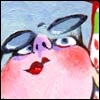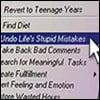
When I was a teenager, I used to have a book of quotes. It was orange, with lined white paper, and the cover was decorated with colorful puffy paint of peace signs and hearts. I started writing in it at the age of 14, and by the time I was 17 it was completely full. I took this book with me everywhere I went, and hid it in a secret spot so that my younger siblings wouldn’t find it. I would copy over poems, bumper sticker or billboard messages . . . anything that moved or inspired me.
Recently, when I was looking through old things, I found this book. I was flipping through, reminiscing at the passages that tugged at my heart and soul, when I found one that completely astounded me. For the life of me I can’t figure out where I would have seen this quote or what I thought it meant at the time, but clearly the seed was planted many years before this quote would become even more relevant in my life.
When I saw these words, they shook me to my coreThe statement was from Rabbi Menachem Mendel of Kotzk, a Chassidic rebbe, long before I had ever heard the word “chassidic.” I had written the quote on its own page, for I must have intrinsically felt its importance. It read: “There is nothing so whole as a broken heart.”
When I saw these words, they shook me to my core. While I can’t figure out what it meant to me then or how I understood it, I know what it means to me now. Our wholeness, our completeness, is a process. And part of that process is allowing ourselves to feel and be vulnerable enough to be broken. If we have never been broken, we can never be whole. I love that. I need that.
We are now in the month of Elul, the month where we focus on rectifying our past while we prepare for our future. The 18th day of Elul, known as “Chai Elul,” is the birthday of the Baal Shem Tov, the founder of the Chassidic movement, as well as the Alter Rebbe, the first Rebbe of Chabad. Chai means “life,” and so this date is known as the “life of Elul,” referring to its vitality and purpose. From the 18th of Elul until Rosh Hashanah there are exactly 12 days, and we are taught that each one of those days is an opportunity to reflect back and make amends for each of the 12 months in the year.
Let me say that again. Each day is an opportunity to rectify an entire month. Pretty powerful. No such thing as saying that it is too late, there is nothing that can be done. There sure is! Be open and honest and willing to ask for forgiveness, from yourself and from others. Twelve days can transform an entire year.
But looking back means being willing to accept and acknowledge our mistakes, the pain we caused and the opportunities we missed. That can be hard. Really hard. And it is so much easier to just close that door and tell ourselves we are just focusing on moving forward. But Elul reminds us that if we want our future to be different than our past, we better take a long and hard look at it, learn from those mistakes and commit to not making them again. Looking back is not being stuck in the past; it is what ensures that the past remain there, and not follow us into our present.
Looking back is not being stuck in the past; it is what ensures that the past remain thereAnd yeah, it is hard, because if it wasn’t, we wouldn’t be growing or developing. And yeah, it hurts, but that is the point. It is not that we want the pain or ask for it, but it makes us who we are, and if utilized correctly, makes us better because of it.
I can’t even begin to remember what heartache I must have experienced at 15 when I wrote down that quote. It must have been pretty painful, though, if the words of a broken heart moved me and connected to me. And I bet if you asked me then, I would have believed that the pain was something I never would forget, and probably something I never would get over. But I did. And at the same time, it changed me.
That 15-year-old is part of who I am today. And what that 15-year-old saw and related to still moves me, and even defines me to a point. I wrote that quote down years before I ever knew what Chassidic philosophy was, or ever heard of the Baal Shem Tov. But I connected to the words of a Chassidic rebbe, who himself drew on the Baal Shem Tov’s teachings—and then now, as we approach Chai Elul, I come across my book, my dearest possession from over 25 years ago. And how true those words ring, reminding me once again that whatever pain I currently experience will one day be lessened, but the lesson from that pain will remain with me forever. For those words are so true: “There is nothing as whole as a broken heart . . .”






